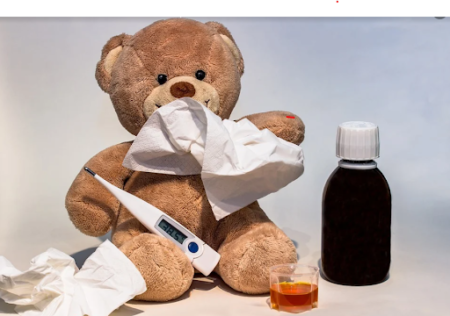10 December 2021
By Roger Jones
roger@TheCork.ie
For many people, winter marks the start of various health issues. The new variant of Omicron is looming over us, and although COVID is still a massive threat, hopefully, the double vaccinated are feeling a little bit safer. Despite this, many common winter illnesses are still kicking about, which can feel just as awful if you catch them.
During multiple lockdowns, while we were doing our DIY projects and making impromptu sheds, it was hard to come in contact with many of the germs we would usually encounter on a normal, everyday basis. For example, on a bus, you would be breathing in many different germs from different people from other areas to you, have come into contact with different germs to you, and thus start to pass on their pathogens. A virus can enter through your mouth, eyes and nose. For example, droplets containing a cold virus can spread when someone coughs, talks or sneezes, and can be basically impossible to completely and utterly avoid.
A mask can help but can’t entirely guarantee that these pathogens won’t make their way to you. The droplets can also remain on surfaces and end up near your mouth and nose, where you can inhale them and contract the virus. It can be unclear where to start when trying to prevent illness during the winter months, so here is your guide to making your health a priority this winter, with handy tips and tricks to make your holidays and beyond a healthy season for your body.
Photo by Brittany Colette on Unsplash
The Common Cold
The simple common cold is the first and most immediately obvious threat to your health this winter. The common cold has been around for centuries and looks set to stick around for centuries. The symptoms can include a runny nose, headache, fever, achiness, and a sore throat. Although cures for this common ailment have progressed to cold and flu sachets and cough sweets to fight against the uncomfortable, stuffy nose and headache, managing a cold used to be enough to make stomachs turn. For example, in ancient Greece and medieval Europe, bloodletting and leeches were common treatments doctors promised would help cure illness. However, there is one belief we still share with our ancestors surrounding a cold: prevention is better than a cure. To prevent coming down with a cold this winter, you can take a few steps.
First and foremost, you should drink lots of fluids all the time. This can be water, tea, squash, or anything that will help your body stay hydrated at all times. The body needs water to carry out all of its primary functions, especially when fighting off an infection, so make sure you drink lots of water or eat lots of water-based fruit like cucumber and watermelon to stay as hydrated as possible.
Another prevention method for the common cold is to ensure that you get enough rest. This can typically be around seven hours or more every night. Sleeping is vital for maintaining a healthy immune system and healing and repairing your body every night. If you don’t get enough sleep, the body can become tired and more prone to injury and infections, as It hasn’t had enough time to rest, repair, and reset for the day ahead. Remember that seven hours is also the bare minimum, and you will often actually need more than this if you want to be healthy and happy- especially if you have had a long day.
Additionally, prevention can come in the form of eating a healthy diet. This can mean eating a variety of vegetables to ensure you are getting the vitamins and nutrients your body needs to fight off infections and prevent them at their source when they enter your system. You need to ensure you are eating different subgroups, such as dark leafy greens and vegetables, red and orange vegetables, starchy vegetables, and legumes. A top tip would be to get a tray on a Sunday night and chop and season a massive variety of vegetables. Traybake the vegetables for 15 minutes and 180 degrees and add them to any dishes you make in the next few days. This ensures you are hitting your targets for variety quickly every day and with minimal effort on your behalf. Protein-rich foods can also be beneficial to fight off the common cold, as the protein aids your body’s healing process.
Vitamin D
Most of us struggle with one essential vitamin in winter- vitamin D. We typically don’t get enough vitamin D in winter as our primary uptake source. The sun is less present during the day and often feels much weaker. Vitamin D helps strengthen bones and defend against diseases, increasing our energy levels dramatically. It is most important to bear this in mind during winter where it can be hard to even get out of bed while it is dark outside. However, there are other ways to ensure you are getting enough vitamin D in your diet without sun exposure. Diet, again, is an essential factor. Consume more mushrooms with fatty fish and seafood, and you should be feeling more energetic, giving your body more energy to prevent any colds that come your way. A UV lamp can also help to ensure your body is getting a good uptake of Vitamin D. Remember that naturally getting vitamin D is the best way, so go for walks whenever the weather allows, making sure you make the most of clear, crisp winter weather.
Following on from walking in the sunshine, the next way to avoid a bad cold is to keep exercising. Although it may be the last thing you want to do (goodness knows hibernation can be tempting in winter), exercising can boost your immune system and ensure your body is in tip-top shape to fight infection. Not to mention that it is great for your mood too. Try briskly walking or going on regular runs to ensure you are getting enough exercise.
To physically prevent a cold from happening, it is best to wash your hands as regularly as possible to stop pathogens from entering your mouth and nose. It may be worth buying some hand gel, too, for moments where washing your hands isn’t possible.
SAD
It is good to remember that Your mental health is just as important as your physical health. In that case, The next threat to your health this winter is SAD. SAD is a seasonal depression estimated to affect over 10 million people in America. SAD can leech victims of energy and lower the sufferer’s mood throughout the winter months. In order to combat this form of depression, you should again focus on getting as much sunlight as possible during the day. Make sure that you also have lots on your schedule to look forwards to, such as checking in with friends, walks around the park, and even considering joining a club for something you enjoy doing. Maintaining a healthy sleep and exercise schedule will also ensure you have a routine to stick too which will help a lot.
A Cough
A cough, or Bronchitis, is also prevalent during the winter months. A cough can start as a dry cough and soon turn into a mucus-producing cough. If you begin to suspect you have a cough coming on, there are a few things you can do to prevent and alleviate symptoms. The first is to turn your heating down. The heating in your house can dry the air out and make your signs much worse. If the heating can’t be helped because of family of shared living spaces, you could try putting a diffuser on one of these scaffold board shelves next to your bed. This will help moisten the air and reduce coughing fits. Invest in some good cough lozenges that will help a sore throat that often can start before the coughing. Also, make sure you are drinking loads of fluids to ensure your body has enough liquid to fight off germs that could cause a chest infection. Early prevention is key in almost all the ailments that can plague us in winter.
To surmise, there are a few things you can do to try and keep yourself as healthy as possible this winter. Make sure you are getting as much fresh air as possible, as much sunlight as possible, and as many vitamins and minerals. Drink water as often as possible. Remember that it is also crucial to listen to your body during the winter months to gain as much relaxation as possible, especially if your body is telling you it needs extra rest. Many physical signs will help you to tell when your body is about to come down with something. Make sure you don’t ignore the symptoms when they appear as that is when your health can start to decline.




